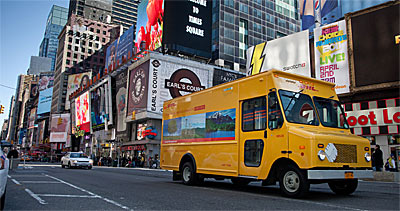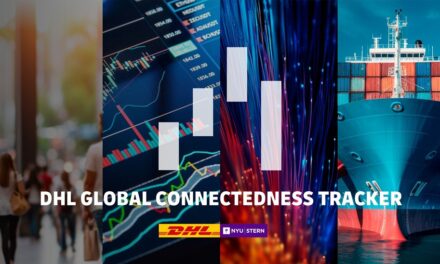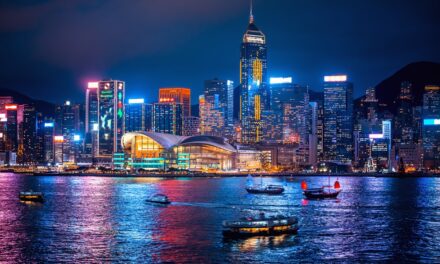
DHL launches major test for electric delivery vehicles in Manhattan
DHL is to convert its entire fleet of commercial delivery vehicles in Manhattan to electric and hybrid electric vehicles over the next few months. 
The company revealed yesterday that it will test out 80 vehicles converted by Detroit-based Azure Dynamics, using two types of chassis provided by Ford, phasing up to 10 vehicles in each month.
A $4m investment is being put into the initiative, backed by some public funds in the form of tax credits from the New York Mayor’s office, with the trucks costing around $60,000 each.
Complete deployment of 50 electric-hybrid Ford E450 trucks and 30 all-electric Transit Connect vans is expected to be achieved by September.
DHL said the vehicles would cut carbon dioxide emissions by around 50% compared to standard delivery trucks.
While its rivals including FedEx and UPS also testing out alternative vehicle technologies, DHL said yesterday that it is taking the bold step of converting an entire fleet to the more environmentally-friendly electric power, although it did test a couple of the vehicles in Boston last year.
“Our whole operation based out of the local facility here will be completely supported by green vehicles,” said Ian Clough, chief executive of DHL Express USA.
“This is a significant test – it’s one thing to test one or two vehicles as part of a fleet, but for us to have the whole of Manhattan running these is a huge test for us.”
Vehicles
Mike Byers, director of fleet sales at vehicle conversion specialists Azure Dynamics said the virtually-silent all-electric vehicles had a range of up to 80 miles on a single charge, with a 75mph top speed and zero emissions from their tailpipes.
Hybrid vehicles would be more suitable on higher speed routes, he explained, since higher speeds deplete the lithium-ion batteries much more quickly. The hybrid E450s are expected to improve fuel economy by about 40%, while cutting emissions by about 30%.
Stuart Irwin, business operations manager at ClipperCreek, the California-based electric charging station manufacturer providing infrastructure for the Manhattan project, said 30 stations would be installed over the coming weeks for DHL.
The “level 2” 220-Volt charging stations would allow a full charge, from fully depleted batteries, in around eight hours for the all-electric vehicles.
The electric hybrids are not plug-in vehicles, so have their electric batteries charged by the onboard gasoline engines.
Irwin’s company is working with various other fleet operators across North America as the Obama Administration’s economic stimulus funding supports a boom in the technology. He told Post&Parcel that using electricity instead of gasoline could mean a tenth of the energy costs, although he said New York utility rates were on the high side comparatively.
“If you were to buy a dedicated supply of renewable energy – like, for example ConEd can provide here, from wind power – you can also improve the carbon emissions savings even further using these kind of vehicles,” he said. Currently, the average supply of electricity in the US is about 10% renewable.
GoGreen initiative
The green efforts come as part of DHL’s worldwide sustainability programme, GoGreen, which already offers customers in many parts of the world the option of a carbon offsetting programme, to offset their shipments with investment in environmental projects, rendering shipments “carbon neutral”.
DHL is intending to extend its carbon neutral shipping service to the US in the second quarter of 2011.
Frank Appel, chief executive for Deutche Post DHL, said yesterday: “We live in a carbon world, we are reliant on oil and we are not getting away from that. We are investing in our own carbon emissions programmes because we believe that is better than others’, but our customers are demanding that we try alternative fuels as well.
“It’s smarter to avoid carbon emissions than to offset them,” Appel said, adding that investing in greener technologies would improve DHL’s image in society.
In the past year, DHL has been upgrading its delivery vehicles worldwide, including in Europe and Latin America.
The long-term plan is to spread the Manhattan model to other sites among the company’s 90 sites across the US, although the DHL executives were unable to give an idea of how long such a move might take.
Azure Dynamics has not been contracted to provide further vehicles to DHL beyond the 30, and with demand from other fleet operators is currently sold out well in advance.
As he spoke to Post&Parcel, Appel explained that the wider adoption of this newer vehicle technology depended on whether the costs become more “reasonable”.
“We are testing a lot of different vehicles around the world,” he said. “The key driver is how fast the technology develops, and how the price comes down. If the technology gets cheaper, then we will know what to use. It depends on the scale available and the price.”
In the mean time, he said it was important for DHL to look at how to get the infrastructure in place and test how technologies perform in different conditions.
In New York, DHL has deliberately chosen a city in which the vehicles will face a stern test – both in terms of traffic and road conditions, as well as extreme temperature and weather conditions, particularly in winter.
Although the company said it did not expect its investment in the Manhattan project to “pay off” in terms of the fuel savings achieved by the more efficient trucks, Appel said the trial was being carried out to “meet the expectations of our customers”.












